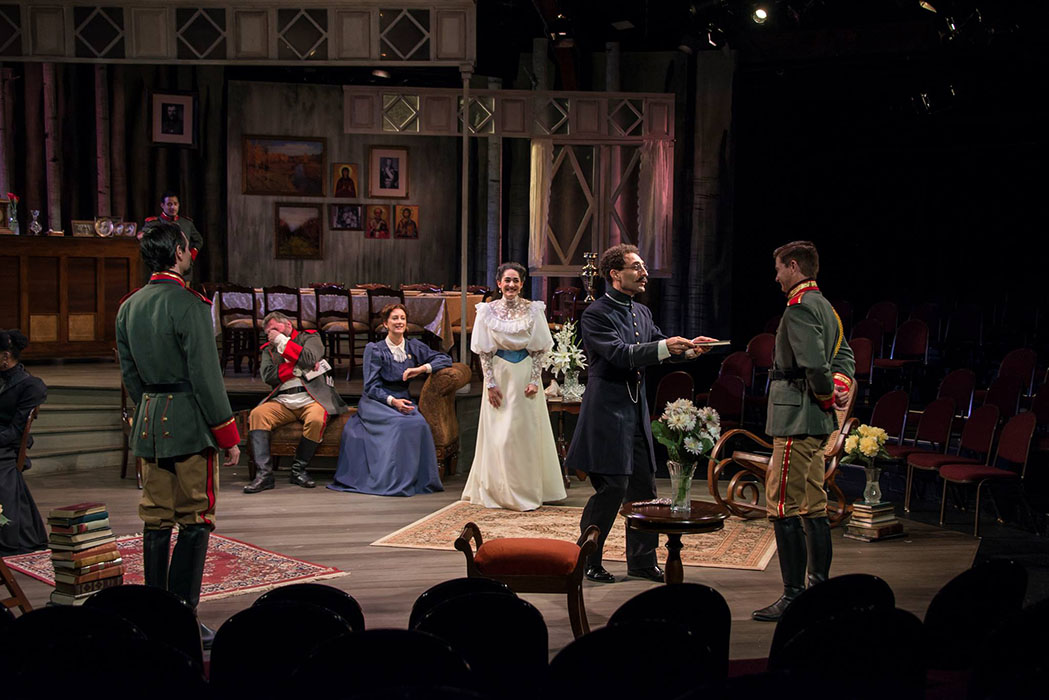In many ways similar to how “Shakespearean” is an accepted adjective, so is “Chekhovian” in referring to the works of the playwright and short story writer, Anton Chekhov. However, while “Shakespearean” is an expansive reference by virtue of quantity, scale, and theatrical influence, the word “Chekhovian” draws us into quite a different world, one that has a specific reputation for its depiction of family and societal relationships in pre-Revolution, fin de siècle Russia. Chekhov has also been attracting a growing number of quasi-parodies, such as Christopher Durang’s Vanya and Sonia and Masha and Spike, a statement in itself of the playwright’s effect on audiences. Knoxville is embracing that Chekhovian world this October, it seems, with a production of Chekhov’s Three Sisters at Clarence Brown Theatre’s Carousel Theatre, as well as a companion program, “ChekhovFest” [see note below] of other Chekhov works, lectures, and discussion groups.
This intensely satisfying CBT production of Three Sisters, which opened last Friday evening under the direction of Michael Fry, moves through that world with a good deal of directness, thanks to a relatively new version of the play by Libby Appel, Artistic Director Emerita of the Oregon Shakespeare Festival. Appel’s version seems to clarify emotional responses in the language and open up some areas of background reference that may have been historically omitted.
The world of Three Sisters is quintessential Chekhov in which characters are hopelessly caught in a vicious circle of inaction that breeds frustration—and a philosophical weariness that leads to further desperation. Originally from Moscow, the Prozorov sisters—Olga, Masha, and Irina—and their brother, Andrei, have been living in a small town where their army officer father had been assigned a post. As the play begins, it has been a year since the death of their father, an event that has trapped them in the provincial environment with their only outlet to social relationships being the company of army officers from the nearby post.
Olga, the eldest sister, played by Emily Kicklighter, has become a local school teacher, a dreary and meaningless position that weighs heavily on her. One can almost see that weight on her shoulders thanks to Kicklighter’s skillful blending of a restless, but weary calm masking an underlayer of desperation. Masha, married at 18 to the local school teacher Kulygin (Christopher Tramantana), and now 23 and intensely unhappy with her marriage, was played by Carléne Pochette with a simmering volatility that hides her vulnerability to extramarital romance. The youngest sister, Irina, played with a sense of frustrated energy by Lauren Pennline, has the largest arc of character throughout, from the proclaimed happiness of naïveté to demonstrated unhappiness of a woman forced out of her comfort zone.
All the while, the sisters’ only notable social connections in the town are the army officers who apparently have little to do outside of meaningless training exercises. Tuzenbakh, a Baron and a lieutenant, played by Joseph McGranaghan, is smitten with Irina. The newly arrived Commander, Vershinin, given marvelous life by Christian Gray, knew the family years ago in Moscow, but seems weighed down by his own lot in life. The older army doctor, Chebutykin, played with superb skill by Roderick Peeples, is a distinct Chekhov type—one who is resigned to meeting problems and crises with the non-question “What difference does it make.”
Meanwhile, brother Andrei (Brian Gligor) has seen his prospects and ambitions slip away, marrying the lovely, but unschooled and “unfashionable” Natasha (Charlotte Munson), attracted, no doubt, by her being a complete opposite. Unfortunately for Andrei and sisters, her shyness becomes a cruel dominance as Natasha takes over the household with a barely veiled vehemence toward the sisters and a stunning lack of humanity in general. One cannot help believing Chekhov saw such a character as a sign that Russian elites, in a constant state of yearning yet frozen by inaction, had much to fear from the unfashionable masses unafraid to use their energy to gain a foothold.
The production has seized upon an attractive partial wrap around arrangement in the Carousel Theatre, with scenic designer Jelena Andzic creating a marvelous multi-level arrangement, all in dusty, muted colors that were enhanced and punctuated by lighting designer Alice Trent and costume designer Bill Black.







